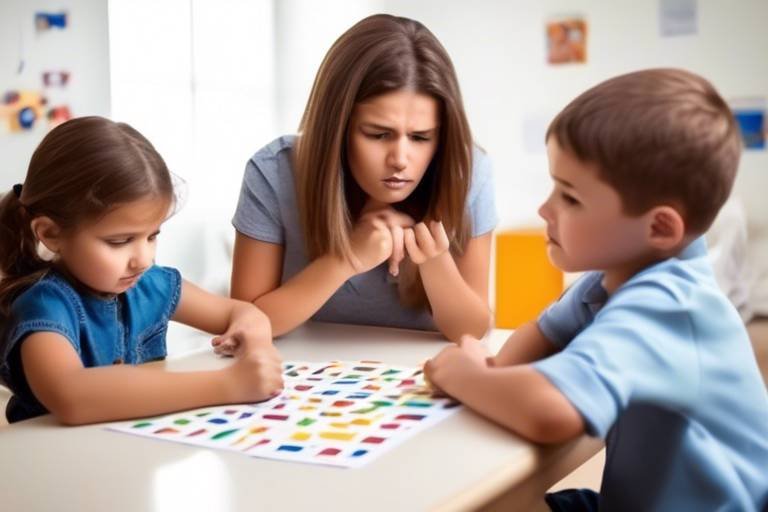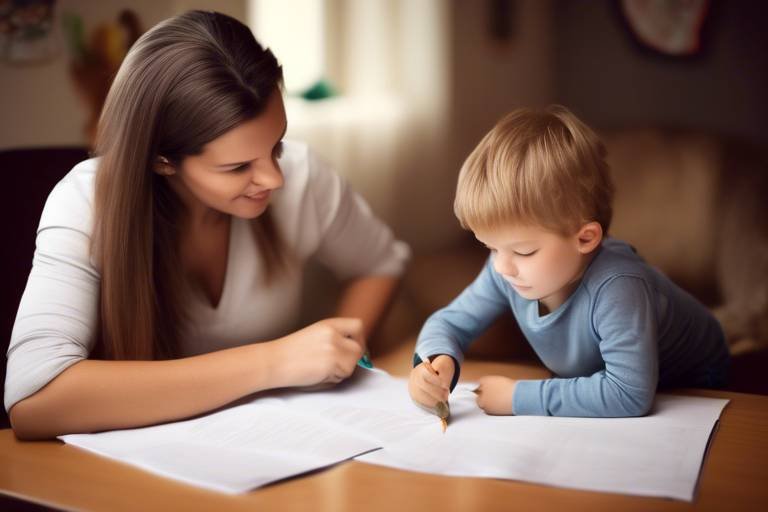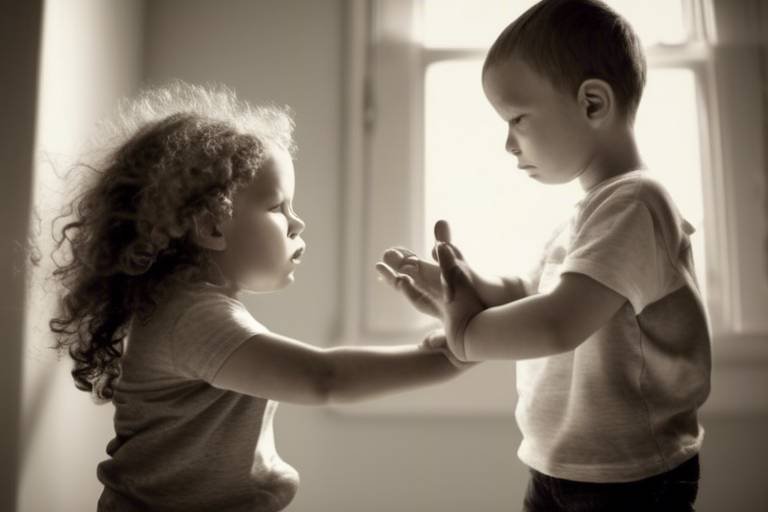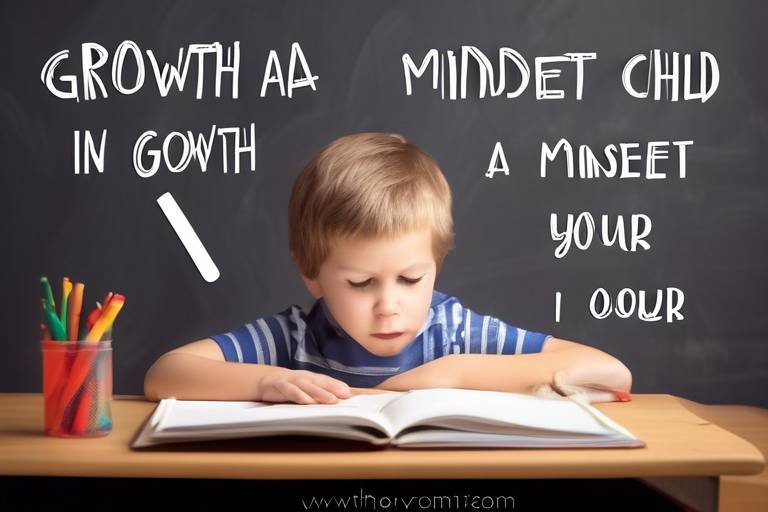How Different Parenting Styles Impact Child Development
Understanding how different parenting styles influence child development is crucial for fostering a nurturing environment. Parenting is not just a set of rules; it's an art that shapes the very essence of a child's personality, emotional health, and social skills. Each style—authoritative, authoritarian, permissive, and neglectful—carries its own unique impact, like a brushstroke on a canvas, contributing to the larger picture of a child's growth. So, how do these approaches differ, and what does that mean for our little ones? Let's dive into the fascinating world of parenting styles and their effects on child development.
Authoritative parenting is often seen as the gold standard, characterized by high responsiveness and high demands. Parents who adopt this style are nurturing and supportive while also setting clear boundaries and expectations. Imagine a garden where plants are given both sunlight and water; this balance fosters healthy growth. Children raised in authoritative households tend to develop strong self-esteem, excel academically, and possess excellent social skills. They learn to express their thoughts and feelings openly, cultivating emotional intelligence. Research shows that these children are more likely to become independent and successful adults, equipped with the tools to navigate life's challenges.
In contrast, authoritarian parenting is marked by high demands but low responsiveness. Think of it as a strict military boot camp. While children in these environments may learn to follow rules and be obedient, they often struggle with emotional development and creativity. The rigid structure can stifle their ability to think independently, leading to issues like anxiety and low self-esteem. These children may comply outwardly but often harbor feelings of resentment or rebellion. The lack of emotional support can make it difficult for them to form healthy relationships later in life.
Permissive parenting is characterized by high responsiveness but low demands. Picture a free-spirited artist who allows their child to explore without restrictions. While this approach can foster creativity and self-expression, it may also lead to challenges with self-discipline and authority. Children raised in permissive households often struggle to understand boundaries, making it difficult for them to navigate structured environments, such as schools. They may excel in creative pursuits but find it hard to adhere to rules and expectations, which can create conflict in their lives.
Neglectful parenting features both low responsiveness and low demands, akin to a ship adrift at sea without a captain. This style can have detrimental effects on a child's emotional and social development. Children may feel abandoned or unworthy, leading to a host of behavioral issues, including anxiety, depression, and trouble forming relationships. The lack of guidance and support can result in poor academic performance and difficulties in social settings, leaving these children ill-equipped to face the challenges of adulthood.
Cultural context plays a vital role in shaping parenting styles. Different cultures have unique values and beliefs that influence how parents raise their children. For instance, collectivist societies may emphasize family and community over individualism, affecting the expectations placed on children. This can lead to variations in discipline methods, emotional expression, and educational priorities. Understanding these cultural nuances can provide insights into why certain parenting styles are prevalent in specific communities and how they impact child development.
Gender can also influence parenting styles and expectations. Research indicates that mothers often adopt a more nurturing and empathetic approach, while fathers may lean towards being more authoritative or playful. This dynamic can shape a child's perception of gender roles and relationships. For instance, children may learn different coping strategies and social skills based on their interactions with each parent. Understanding these differences can help parents collaborate more effectively, providing a well-rounded upbringing that benefits their child's development.
The long-term consequences of different parenting styles are profound. Early experiences can shape personality traits, coping mechanisms, and life outcomes in adulthood. For instance, children raised in authoritative households are more likely to develop resilience and strong interpersonal skills, while those from authoritarian backgrounds may struggle with self-esteem and decision-making. Recognizing these patterns can empower parents to make informed choices about their parenting approaches, ultimately leading to healthier, more successful adults.
So, how can parents adopt a balanced approach that combines the best elements of various parenting styles? Here are some practical strategies:
- Set clear expectations while providing emotional support.
- Encourage open communication and active listening.
- Foster independence while maintaining appropriate boundaries.
- Be consistent with discipline but flexible in understanding.
By blending these strategies, parents can create a nurturing environment that promotes healthy growth and development.
For those looking to deepen their understanding of effective parenting strategies, here are some valuable resources:
- Books: “The Whole-Brain Child” by Daniel J. Siegel and Tina Payne Bryson.
- Websites: The American Academy of Pediatrics (AAP) offers a wealth of information.
- Podcasts: “The Longest Shortest Time” focuses on parenting topics.
1. What is the most effective parenting style? - Authoritative parenting is often considered the most effective due to its balance of support and expectations. 2. Can parenting styles change over time? - Yes, parents can adapt their styles as they learn and grow, and as their children develop. 3. How do cultural differences affect parenting? - Cultural values shape beliefs about discipline, education, and emotional expression, influencing parenting styles. 4. What resources can help me improve my parenting skills? - Books, websites, and parenting classes can provide valuable insights and strategies.

Authoritative Parenting
stands out as one of the most effective and beneficial styles for fostering healthy child development. This approach is characterized by a balance of high responsiveness and high demands. Parents who adopt this style are nurturing and supportive while also setting clear boundaries and expectations. Imagine a warm, inviting garden where plants are given both sunlight and structure to grow tall and strong. That’s what authoritative parenting aims to achieve for children.
Research has shown that children raised by authoritative parents tend to develop a strong sense of self-esteem and confidence. They are often more successful academically and socially, as they learn to navigate the complexities of relationships and challenges with resilience. This is largely because authoritative parents encourage open communication and allow their children to express their thoughts and feelings. They listen actively, making children feel valued and understood, which in turn fosters a strong emotional bond.
In practical terms, authoritative parents set clear rules and expectations but also provide the reasoning behind these guidelines. For instance, instead of simply saying, “You must finish your homework before playing,” an authoritative parent might explain, “Completing your homework first will help you understand the material better and make your playtime even more enjoyable.” This not only teaches children the importance of responsibility but also encourages them to think critically about their actions.
Furthermore, children raised in an authoritative environment often exhibit better social skills and emotional regulation. They learn to cooperate with others, understand the concept of compromise, and develop empathy. Authoritative parents typically encourage their children to engage in group activities and discussions, allowing them to practice these skills in real-life scenarios. As a result, these children are more likely to form healthy relationships and navigate social dynamics effectively.
In summary, the authoritative parenting style serves as a robust framework for nurturing well-rounded children. By combining warmth with structure, parents can help their children thrive emotionally, socially, and academically. It’s a style that not only promotes immediate compliance but also prepares children for the challenges of adulthood, equipping them with the tools they need to succeed in various aspects of life.

Authoritarian Parenting
Authoritarian parenting is a style that emphasizes high demands and low responsiveness. Think of it as a strict military regime where rules are set in stone, and obedience is the only acceptable response. Parents who adopt this style often believe that they know best and expect their children to follow their directives without question. While this approach can instill a sense of discipline and order, it often comes at a significant cost to a child's emotional and social development.
Children raised in authoritarian households may excel in following rules and completing tasks, but they often do so out of fear rather than understanding. This can lead to a lack of creativity and problem-solving skills because these children are conditioned to seek approval from authority figures rather than thinking independently. Imagine a bird in a cage: while it may learn to perform tricks for its owner, it never learns how to fly freely. This analogy captures the essence of what authoritarian parenting can do to a child’s spirit.
Moreover, the emotional repercussions of this parenting style can be quite profound. Children may develop a sense of resentment towards their parents, feeling that their voices are stifled and their opinions are invalid. This can lead to issues such as anxiety, low self-esteem, and even rebellion during adolescence. They may struggle to express their feelings and thoughts, fearing that they will be dismissed or punished.
In many cases, the lack of emotional support in authoritarian households can result in children who are obedient but emotionally stunted. They may excel academically due to the pressure to perform but struggle to build meaningful relationships. The emphasis on obedience can leave little room for emotional intelligence, which is crucial for navigating the complexities of human interactions.
To further illustrate the differences in parenting styles, here’s a quick comparison in the table below:
| Aspect | Authoritarian Parenting | Authoritative Parenting |
|---|---|---|
| Demandingness | High | High |
| Responsiveness | Low | High |
| Child's Emotional Expression | Suppressed | Encouraged |
| Independence | Limited | Fostered |
In conclusion, while authoritarian parenting can yield compliant children, it often does so at the expense of their emotional health and creativity. Understanding this parenting style's impact is crucial for parents who wish to raise well-rounded, emotionally intelligent children. By recognizing the potential pitfalls of this approach, parents can strive for a more balanced method that encourages both discipline and emotional growth.
Q: What are the main characteristics of authoritarian parenting?
A: Authoritarian parenting is characterized by high demands, strict rules, and low responsiveness. Parents expect obedience and often do not provide emotional support or open communication.
Q: How does authoritarian parenting affect a child's self-esteem?
A: Children raised in authoritarian environments may struggle with low self-esteem due to a lack of emotional support and validation. They often feel that their opinions and feelings are not valued.
Q: Can authoritarian parenting lead to rebellion in teenagers?
A: Yes, children raised in authoritarian households may rebel during their teenage years, as they seek independence and the ability to express themselves freely.

Permissive Parenting
Permissive parenting is a style that often evokes mixed feelings. On one hand, it’s characterized by a warm, nurturing approach where parents are highly responsive to their child's needs and desires. They tend to be more like friends than authority figures, often allowing children considerable freedom. This can foster a sense of creativity and self-expression in children, as they are encouraged to explore their interests without the constraints of strict rules.
However, while permissive parenting can lead to **increased creativity** and **strong emotional bonds**, it also comes with its own set of challenges. Children raised in permissive households may struggle with self-discipline and authority. Without clear boundaries, they might find it difficult to navigate situations where rules and expectations are necessary. This lack of structure can lead to issues such as:
- Difficulty in following rules at school
- Challenges in developing self-regulation skills
- Potential issues with authority figures, such as teachers or coaches
Imagine a garden where flowers grow wild and free, without any gardener to prune or guide their growth. While the flowers may bloom beautifully, they might also become tangled and chaotic without the right support. Similarly, children who experience permissive parenting may flourish in their creativity but can become overwhelmed when faced with the need for self-control and discipline.
Moreover, permissive parenting can sometimes lead to a lack of respect for boundaries. Children might grow up believing that they can always get their way, leading to potential conflicts with peers and adults. It’s essential for parents to strike a balance between being nurturing and providing the necessary structure that helps children thrive. A well-rounded approach can help children learn to express themselves while also understanding the importance of rules and limitations.
In conclusion, while permissive parenting can foster a nurturing environment that encourages creativity, it’s crucial for parents to also establish some boundaries. This balance can help children develop essential life skills, allowing them to navigate the world with confidence and respect for themselves and others.

Neglectful Parenting
Neglectful parenting is often regarded as one of the most detrimental styles when it comes to child development. This approach is characterized by a lack of responsiveness and low demands, which can create a void in a child's emotional and social growth. Imagine a plant that receives no water or sunlight; it may survive for a while, but ultimately, it will wither and die. Similarly, children raised in neglectful environments often struggle to thrive emotionally and socially.
When parents are neglectful, they may be physically present but emotionally absent. This can lead to feelings of abandonment and low self-worth in children. They might feel like they are not important or valued, which can have long-lasting effects on their mental health. Studies show that children from neglectful homes are at a higher risk of developing issues such as anxiety, depression, and behavioral problems. The absence of a supportive environment can stifle their ability to form healthy relationships and develop essential social skills.
Moreover, neglectful parenting can manifest in various forms, including:
- Emotional Neglect: Failing to provide emotional support and affection.
- Physical Neglect: Not meeting basic physical needs such as food, shelter, and safety.
- Educational Neglect: Ignoring a child's educational needs and failing to provide proper schooling or encouragement.
Children raised in such environments often exhibit a range of behavioral issues. They may act out in school or struggle to connect with peers, leading to isolation and further emotional distress. The lack of guidance and boundaries can result in poor decision-making and a sense of aimlessness as they grow older.
In the long run, the implications of neglectful parenting can be profound. Children may enter adulthood with unresolved emotional issues, impacting their ability to maintain stable relationships and pursue their goals. It’s crucial for parents to recognize the importance of their role in fostering a nurturing environment. By being attentive and responsive, parents can help their children feel valued and secure, laying the groundwork for a healthier future.
- What are the signs of neglectful parenting?
Signs may include lack of supervision, unmet emotional needs, poor hygiene, and academic struggles.
- How can neglectful parenting affect a child's future?
It can lead to emotional issues, difficulties in relationships, and challenges in achieving personal goals.
- What can parents do to avoid neglectful parenting?
Being present, providing emotional support, and setting clear expectations can help create a nurturing environment.

Impact of Cultural Differences
Cultural differences play a pivotal role in shaping parenting styles and, consequently, child development. It's fascinating to consider how the values, beliefs, and traditions of a culture can influence the way parents raise their children. For instance, in some cultures, a strong emphasis is placed on collectivism, where the needs of the family or community take precedence over individual desires. This can lead to parenting styles that encourage children to be more compliant and community-oriented. In contrast, cultures that prioritize individualism often foster independence and self-expression, resulting in children who are encouraged to pursue their own interests and assert their individuality.
Let's take a closer look at how these cultural frameworks can manifest in parenting practices. For example, in many Asian cultures, parents might adopt a more authoritarian approach, emphasizing discipline and respect for authority. This can lead to children who excel academically due to the high expectations set for them. However, this style might also suppress emotional expression, which is crucial for developing healthy relationships. On the other hand, Western cultures often embrace a more permissive style, promoting open communication and emotional support. While this can nurture creativity and confidence, it might also result in challenges with self-discipline and respect for authority.
Moreover, cultural rituals and practices can significantly impact parenting. In some cultures, parenting is a communal effort, where extended family members play an active role in raising children. This not only provides additional support for parents but also enriches children's social experiences, helping them learn from various role models. Conversely, in cultures where nuclear families are the norm, parents may feel isolated and overwhelmed, affecting their parenting approach and, ultimately, their children's development.
To illustrate these differences, consider the following table that summarizes key cultural influences on parenting styles:
| Cultural Aspect | Collectivist Cultures | Individualist Cultures |
|---|---|---|
| Focus | Family and community | Self and personal achievement |
| Parenting Style | Authoritarian or Authoritative | Permissive or Authoritative |
| Emphasis on Education | High expectations and discipline | Encouragement of exploration and creativity |
| Emotional Expression | Often suppressed | Encouraged and valued |
In conclusion, understanding the impact of cultural differences on parenting styles is essential for recognizing the diverse ways children can develop. As parents navigate their unique cultural landscapes, they must balance tradition with modern influences to foster an environment that supports healthy emotional and social growth. This requires an open mind and a willingness to adapt, ensuring that children receive the best of both worlds—cultural heritage and personal freedom.
- How do cultural differences affect parenting styles? Cultural values shape the expectations and approaches parents take, influencing everything from discipline to emotional support.
- Can a parent adopt elements from different cultural parenting styles? Absolutely! Many parents blend various approaches to create a unique style that fits their family's needs.
- What role do extended families play in parenting across cultures? In many cultures, extended families provide additional support and guidance, enriching the parenting experience and children's social development.

Gender Differences in Parenting
When it comes to parenting, the age-old debate about gender differences often crops up. It's fascinating to consider how mothers and fathers may approach the monumental task of raising children in unique ways. For instance, studies suggest that mothers tend to be more nurturing and emotionally available, while fathers often engage in more stimulating and playful interactions. This doesn’t mean one style is superior; rather, they complement each other and provide children with a balanced emotional and social framework.
Research indicates that mothers are generally more involved in day-to-day caregiving tasks, such as feeding and bathing, while fathers might take on the role of a playmate or guide during activities like sports or exploration. This division of roles can be seen as a reflection of traditional societal norms, but it also highlights how each parent contributes to a child’s overall development. Think of parenting as a dance, where each partner brings their unique rhythm and style to create a beautiful performance.
Moreover, the expectations placed on mothers and fathers can vary significantly based on cultural backgrounds. In some cultures, mothers are seen as the primary caregivers, while fathers assume the role of financial providers. This cultural context can shape how each parent interacts with their children and the values they instill. For example, in a nurturing environment, children may learn empathy and emotional intelligence, while in a more competitive setting, they might develop resilience and assertiveness.
Interestingly, gender differences in parenting also extend to the way children perceive their parents. Research shows that children often view their mothers as confidants, turning to them for emotional support, while they may see their fathers as sources of adventure and fun. This dual perception can foster a well-rounded personality, helping children navigate various social landscapes as they grow.
To illustrate the differences in parenting styles between genders, here's a brief comparison:
| Aspect | Mothers | Fathers |
|---|---|---|
| Emotional Support | High | Moderate |
| Playfulness | Moderate | High |
| Discipline Style | Gentle and nurturing | Firm but fair |
| Involvement in Daily Tasks | High | Moderate |
However, it’s essential to note that these are general trends and not hard rules. Many fathers are incredibly nurturing, and many mothers can be playful and adventurous. The key takeaway is that both parents bring valuable qualities to the table, and children benefit from experiencing a blend of these attributes. By understanding and appreciating these differences, parents can work together to create a supportive environment that fosters healthy child development.
Ultimately, the impact of gender differences in parenting is profound, influencing everything from a child's self-esteem to their social skills. When both parents are engaged and aware of their unique contributions, they lay the groundwork for their children to thrive emotionally and socially. So, whether you’re a mother, father, or a caregiver, embracing your style while recognizing your partner's approach can create a harmonious environment for your children.
- Do mothers and fathers parent differently? Yes, research shows that mothers tend to be more nurturing while fathers often engage in playful activities.
- How do cultural backgrounds influence parenting styles? Cultural norms can dictate the roles of mothers and fathers, affecting their interactions with children.
- Can gender differences in parenting affect a child's development? Absolutely! Different styles can provide unique benefits, contributing to a child's emotional and social growth.

Long-term Effects of Parenting Styles
Understanding the long-term consequences of different parenting styles is crucial for both parents and children. The way children are raised can have a profound impact on their future, influencing their personality traits, emotional health, and even their success in life. Think of parenting as the soil in which a seed is planted; the quality of that soil will determine how strong and healthy the plant grows. In this section, we will explore how various parenting styles can shape a child's trajectory into adulthood.
Research has shown that children raised in authoritative households tend to develop strong self-esteem, good social skills, and a sense of independence. These children often grow into well-adjusted adults who can handle life's challenges with resilience. They are more likely to pursue higher education and have fulfilling careers. On the flip side, those who experience authoritarian parenting may learn to follow rules and obey authority, but they often struggle with low self-esteem and may have difficulties in social situations. The rigidity of this style can stifle creativity and emotional expression, leading to potential mental health issues later in life.
Permissive parenting, while nurturing, can lead to children who lack self-discipline and struggle with authority. These children might excel in creative fields due to their freedom of expression, but they may also face challenges in structured environments like school or work. Finally, neglectful parenting can have the most detrimental effects. Children raised in neglectful environments often experience emotional and behavioral issues, which can manifest as anxiety, depression, and difficulties in forming healthy relationships as adults.
| Parenting Style | Positive Long-term Effects | Negative Long-term Effects |
|---|---|---|
| Authoritative | High self-esteem, good social skills, independence | None significant |
| Authoritarian | Obedience, respect for authority | Low self-esteem, social difficulties |
| Permissive | Creativity, open expression | Lack of self-discipline, authority issues |
| Neglectful | None significant | Emotional and behavioral problems, relationship issues |
It's essential to recognize that these outcomes are not set in stone; they can be influenced by other factors such as peer relationships, education, and individual temperament. However, the foundation laid during childhood plays a pivotal role in shaping how individuals navigate adulthood. For instance, a child who has experienced supportive and responsive parenting is more likely to develop healthy coping mechanisms, while one who has faced neglect may struggle with emotional regulation.
In summary, the long-term effects of parenting styles are significant and far-reaching. By understanding these consequences, parents can make informed decisions that promote not only their children's immediate well-being but also their future success and happiness. After all, parenting is not just about raising children; it's about nurturing adults who can thrive in the world.
- What is the most effective parenting style? Research suggests that authoritative parenting is often the most beneficial for children's development.
- Can parenting styles change over time? Yes, parents can adapt their styles as they learn and grow, and as their children develop different needs.
- How can I assess my parenting style? Reflect on your responses to your child's behavior, your expectations, and how you communicate with them.
- Is it possible to combine different parenting styles? Absolutely! Many effective parents blend elements from various styles to meet their children's unique needs.

Strategies for Effective Parenting
When it comes to parenting, there’s no one-size-fits-all approach. Each child is unique, and as parents, we need to adapt our strategies to fit their individual needs. So, what are some effective strategies that can help you navigate the often tumultuous waters of parenting? Let's dive into some practical approaches that can support your child's growth and development.
First off, communication is key. Establishing an open line of communication with your child can make a world of difference. It’s essential to create an environment where your child feels safe to express their thoughts and feelings. This doesn’t mean you have to agree with everything they say, but showing that you value their perspective can foster trust and emotional security. Ask open-ended questions like, “How was your day?” or “What’s something that made you happy today?” This encourages them to share more than just “fine” or “nothing.”
Another effective strategy is to set clear boundaries and expectations. Children thrive in structured environments where they know what is expected of them. It’s important to communicate these boundaries clearly and consistently. For instance, if you have rules about screen time, explain why these rules exist and what the consequences are for breaking them. This not only teaches discipline but also helps them understand the importance of responsibility.
Moreover, it’s crucial to practice positive reinforcement. Instead of solely focusing on what your child does wrong, celebrate their successes, no matter how small. This could be as simple as praising them for completing their homework or acknowledging their efforts in a sport. Positive reinforcement boosts their self-esteem and encourages them to continue making good choices. Remember, children are more likely to repeat behaviors that are recognized and rewarded.
Additionally, consider incorporating flexibility into your parenting style. Life is unpredictable, and sometimes plans need to change. Being flexible allows you to adapt to your child’s needs and circumstances. For example, if your child is having a tough day, maybe it’s okay to skip the usual chores or have a movie night instead. This shows them that you understand and care about their emotional well-being.
Lastly, don't forget the importance of self-care. Parenting can be exhausting, and it’s easy to forget about your own needs while caring for your child. Taking time for yourself not only benefits you but also sets a positive example for your child. It teaches them that self-care is important and can help them manage stress in their own lives. Whether it’s reading a book, going for a walk, or spending time with friends, make sure to carve out some “me” time.
In summary, effective parenting requires a blend of communication, boundary-setting, positive reinforcement, flexibility, and self-care. By incorporating these strategies, you can create a nurturing environment that supports your child’s emotional and social development. Remember, it’s not about being a perfect parent; it’s about being a loving and supportive one.
- What is the most important aspect of effective parenting? Communication is often cited as the most critical aspect, as it fosters trust and emotional security.
- How can I encourage my child to express their feelings? Create an open environment where your child feels safe to share their thoughts without judgment.
- Is it okay to change parenting strategies as my child grows? Absolutely! Flexibility is key, as different stages of development may require different approaches.
- How can I practice self-care as a busy parent? Schedule regular “me” time, even if it’s just a few minutes a day, to recharge and focus on your needs.

Resources for Parents
In today's fast-paced world, parenting can feel like navigating a maze without a map. Thankfully, there are numerous resources available to help guide parents through the ups and downs of raising children. Whether you're looking for expert advice, community support, or just a good read, the options are plentiful. Understanding the various tools at your disposal can significantly enhance your parenting journey, ensuring you foster a nurturing environment for your child.
Books can be a treasure trove of knowledge. For instance, titles like "The Whole-Brain Child" by Daniel J. Siegel and Tina Payne Bryson provide insights into child development and practical strategies for parents. Similarly, "How to Talk So Kids Will Listen & Listen So Kids Will Talk" by Adele Faber and Elaine Mazlish offers communication techniques that can transform parent-child interactions. These books encourage parents to understand their children better and respond in ways that promote healthy emotional and social development.
Websites and online platforms also serve as invaluable resources. Websites like Parenting.com and Zero to Three offer articles, expert advice, and community forums where parents can share experiences and tips. Additionally, social media platforms have groups and pages dedicated to parenting, providing a space for parents to connect, ask questions, and support one another in their unique journeys.
For those who prefer more interactive resources, workshops and parenting classes can be incredibly beneficial. Many community centers, hospitals, and schools offer programs that cover a wide range of topics, from newborn care to managing teenage behavior. These classes not only provide information but also create opportunities for parents to meet others in similar situations, fostering a sense of community and shared learning.
Finally, don't overlook the power of podcasts and videos. Platforms like Apple Podcasts and YouTube host a variety of parenting-focused content. Shows like "The Longest Shortest Time" and channels like "What Would You Do?" offer relatable stories and expert advice that can inspire and inform parents in their daily lives.
In summary, the resources available to parents today are diverse and abundant. By leveraging books, websites, workshops, and multimedia, you can equip yourself with the knowledge and support needed to raise happy, healthy children. Remember, parenting is a journey, and it’s okay to seek help along the way!
Here, we address some common questions that parents may have regarding parenting styles and resources:
- What is the best parenting style? - There is no one-size-fits-all answer. The best style often depends on the child's personality, family dynamics, and cultural context.
- How can I find support as a parent? - Look for local parenting groups, online forums, or community resources that offer workshops and classes.
- Are there specific books you recommend for new parents? - Yes! Books like "The Baby Book" by William Sears and "What to Expect the First Year" by Heidi Murkoff are great starting points.
- How do I know if my parenting style is effective? - Pay attention to your child's emotional and social development. If they are thriving and happy, your approach is likely beneficial.
Frequently Asked Questions
- What are the main types of parenting styles?
There are four primary parenting styles: authoritative, authoritarian, permissive, and neglectful. Each style has its unique characteristics and impacts on child development, ranging from high responsiveness and demands to low responsiveness and demands.
- How does authoritative parenting benefit children?
Authoritative parenting is known for fostering self-esteem, academic success, and strong social skills. Parents who adopt this style balance high expectations with emotional support, helping children feel valued and capable.
- What are the risks associated with authoritarian parenting?
While authoritarian parenting can lead to obedient children, it often comes at the cost of emotional development and creativity. Children may become fearful of making mistakes and struggle with self-expression due to the rigid expectations.
- Can permissive parenting lead to issues later in life?
Yes, permissive parenting can encourage creativity but may also result in problems with self-discipline and respect for authority. Children might struggle with boundaries and expectations as they grow older.
- What is the impact of neglectful parenting?
Neglectful parenting can have severe consequences, leading to emotional and social development issues. Children may face behavioral problems and difficulties in forming healthy relationships due to a lack of support and guidance.
- How do cultural differences affect parenting styles?
Cultural values play a significant role in shaping parenting styles. Different cultures prioritize various traits and behaviors, which can influence how parents interact with their children and the expected outcomes of those interactions.
- Are there gender differences in parenting?
Yes, mothers and fathers often approach parenting differently. These differences can influence the parenting style adopted and can have various implications for a child's development, such as emotional support and discipline methods.
- What are the long-term effects of parenting styles?
Understanding the long-term consequences of different parenting styles is crucial, as early experiences can shape personality traits and life outcomes in adulthood. For instance, children raised in authoritative homes tend to be more resilient and successful.
- What strategies can parents use for effective parenting?
Parents can adopt a balanced approach by combining elements from various parenting styles. This might include setting clear expectations while also providing emotional support, fostering independence, and encouraging open communication.
- Where can I find resources on effective parenting?
There are numerous resources available, including books, websites, and parenting groups. These can provide valuable insights and practical tips for parents looking to enhance their parenting skills and support their children's development.



















